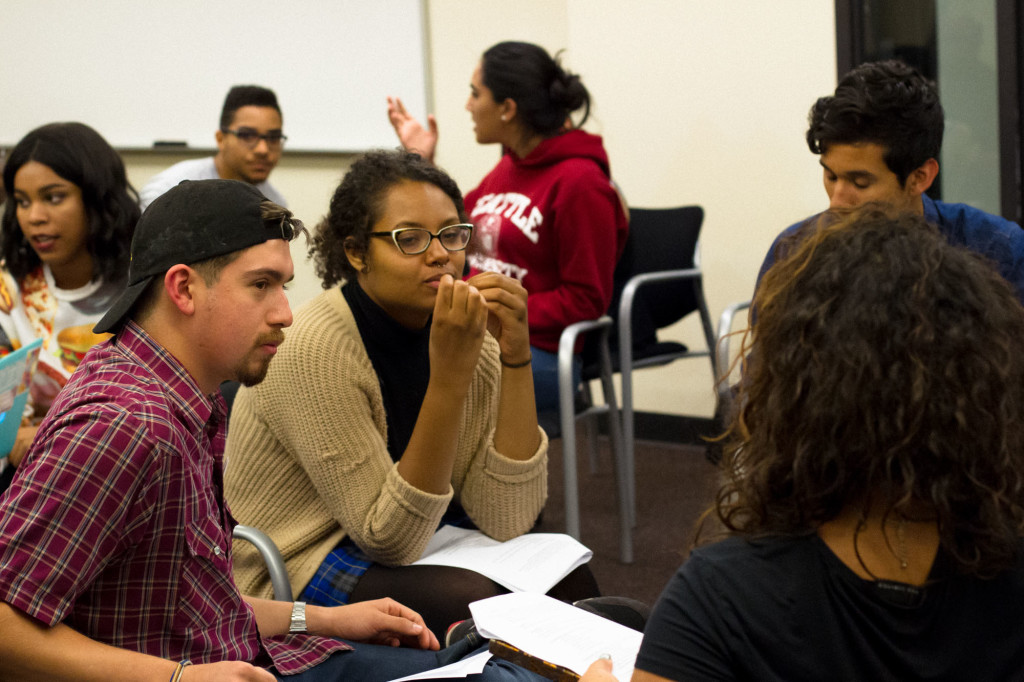n light of the Black Lives Matter Movement, students at Seattle University are trying to answer difficult questions about race. Questions like what it is like being a student of color at our school, how racism exists on campus and how students can get involved in racial justice work were just a few brought up at a recent Moral Mondays at SU event.
This week’s Moral Monday featured a student-led discussion hosted by Seattle U’s Black Student Union. More than 50 people attended.
Amrit Singh is a sophomore at Seattle U. She started coming to Moral Monday after she heard on the news that Michael Brown was shot and killed in Ferguson, MO.

This weeks Moral Monday was put on by the Black Student Union to talk about inclusivity on campus.
“A lot of conversation isn’t happening. A lot of the people that show up here are the same people that show up to all events that are similar to this. There is a lot more conversation to have outside of this group of people,” Singh said. “But I think the conversation was healing in its own way. It’s empowering to see that they are equally as engaged.”
The interactive “fish bowl” conversation was directed by a panel of five students. Audience members were encouraged to “tag in” whenever they felt that they had something to add to the discussion or if they wanted to ask a question to the group. The panelists did not hesitate in bringing up otherwise sensitive topics. They called upon audience members to compare their own definitions of race and ethnicity, multiculturalism and post-racialism, and the inconsistencies that tend to form between diversity, cultural competency, and racial justice.
This was freshman Alicia Guevara’s first time attending a Moral Monday event.
“In this panel, it was really helpful to hear what other people thought, what they felt, and to see that you may have not been the only one to feel that way,” she said. “It really opened the different perspectives people have on racial justice.”
Nicolas Cruz, one of the panelists and a member of BSU, reminded audience members throughout the discussion to embrace discomfort, anger, and failure. Each are crucial in remaining open-minded, especially when discussing racial inequality.
At one point during the discussion, Cruz explained how racism is “a made-up thing that has real consequences.”
“The black liberation movement is what led and will continue to lead all other movements,” he said.
Tyrone Brown, administrative coordinator for Counseling and Psychology Services first suggested creating Moral Mondays as Seattle U as part of the Black Lives Matter initiative. The inspiration came from his trip to Ferguson. After seeing the news on TV and social media, he felt that he needed to see for himself the consequences of racial injustice.
“It was the one time when I felt like I just needed to go for myself, and just see. Instead of hearing about it on the news or seeing it on television or Facebook, I said that I need to go this one time to this place in space where this thing has happened,” Brown said.
Upon returning to Seattle U, Brown said his relationships within the school and his role as a member of the faculty changed dramatically.
“I’m more aware of the black students on campus, I’m more curious about their needs, I’m starting to formulate an idea of what I think the future should be like for black students,” Brown said. “As a staff member, as an alumni, and as a community member, and someone who really believes in the mission of Seattle University, maybe my role is to use Moral Mondays in a way to focus on the black presence here on campus, both past, present, and future.”
Moral Mondays events range from open discussions and solidarity gatherings to screenings of documentaries and dance practice for a step team. They serve as an outlet for those who want to discuss or find ways to combat racial injustice at Seattle U.








